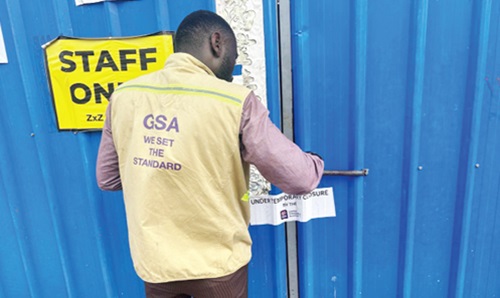The Ghana Union of Traders’ Association (GUTA) has endorsed the deployment of Trading Standards Officers by the Ghana Standards Authority (GSA) to various markets across the country, with the leadership of GUTA declaring that enforcement is essential for the successful implementation and realisation of the government's 24-hour Economy policy.
GUTA's First Vice-President, Clement Boateng, said the initiative would significantly improve product quality and ensure fair measurement practices in markets in the country.
In an interview with the Daily Graphic, Mr Boateng said there was a critical need for continuous standards enforcement across the country’s commercial landscape.
Substandard goods
He highlighted the alarming prevalence of substandard goods in markets, particularly in the electronics and automotive sectors.
Mr Boateng stated that some electrical cables and vehicle parts on the local market were not up to international safety standards, posing serious risks to consumers or users.
"These inferior products don't just perform poorly; they can cause fires or lead to accidents.
The GSA's presence will help weed out these dangerous items," he said.
He stressed that these quality issues posed significant public safety concerns that would only be exacerbated in an extended-hours trading environment.
Accurate measurements
The association’s First Vice-President also drew attention to widespread irregularities in measurement systems, where traditional measuring containers such as the “olonka” are often manipulated to favour sellers.
He said in the absence of a proper weights and measurement regime in markets across the country, what should be a standard measurement often became whatever the seller decided.
“This cheating has become normalised in our markets," Mr Boateng said.
While commending the enforcement efforts, Mr Boateng emphasised the need for public education alongside regulatory actions.
He pointed out that many traders continued with these practices out of tradition rather than malice.
"Some of these traders don't realise they're engaging in unfair practices. The inspectors should educate while they enforce," Mr Boateng said.
He suggested that this educational component should be intensified as trading hours extend into night periods under the 24-hour Economy policy.
Public education
When the Daily Graphic team visited the market last Monday, traders expressed different opinions.
While many of them are yet to come across any of the enforcement officers or had not had any knowledge of their training and deployment, some welcomed the standardisation efforts and others expressed concerns about potential harassment.
A grains seller at the Mallam Market, Anita Obuobi, appealed for affordable certified scales to facilitate compliance.
“If they make scales available and affordable, people will stop using ‘olonka’, but right now this is what we have,” she said.
Meanwhile, the GSA has assured the public that its officers would collaborate with traders to ensure the smooth implementation of standards.
The Director-General of the GSA, Professor Alex Dodoo, told the Daily Graphic that plans were underway to launch public education campaigns on proper measurement techniques and product quality standards.
He said the 350 Trading Standards Inspectors presently under training at the Ghana Police Training School in Koforidua would carry out public education as part of their mandate upon completing their training.

